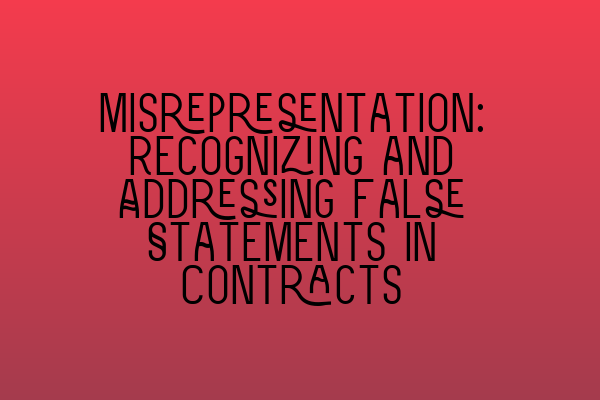Misrepresentation: Recognizing and Addressing False Statements in Contracts
Introduction
Contracts are an essential part of any business transaction, as they outline the rights and obligations of both parties involved. However, in some cases, one party may make false statements or misrepresentations to deceive the other party.
Misrepresentation occurs when a statement made during contract negotiations is false, inducing the other party to enter into the contract. These false statements can range from outright lies to incomplete or misleading information. In this blog post, we will explore the different types of misrepresentation, the legal consequences, and how to address them.
Types of Misrepresentation
1. Fraudulent Misrepresentation
Fraudulent misrepresentation is the most severe form of misrepresentation. It occurs when one party knowingly makes a false statement or conceals material facts with the intention to deceive the other party. This type of misrepresentation is actionable in court, and the innocent party may be entitled to various remedies, such as damages or rescission of the contract.
2. Negligent Misrepresentation
Negligent misrepresentation occurs when a party makes a false statement without reasonable grounds for believing its truth. Unlike fraudulent misrepresentation, there is no intention to deceive. However, the party making the statement should have exercised reasonable care and skill in verifying its accuracy. In such cases, the innocent party may also pursue remedies in court.
3. Innocent Misrepresentation
In some instances, a party may make a false statement innocently, without any intent to deceive. Innocent misrepresentation usually occurs when the party genuinely believes the statement is true, but later discovers its falsity. While innocent misrepresentation does not necessarily give rise to a right to rescission, it may result in a claim for damages.
Legal Consequences
When misrepresentation is established, the innocent party may seek various remedies under contract law. These remedies aim to restore the parties to their pre-contractual position or compensate for any losses incurred due to the misrepresentation. The available remedies include:
1. Rescission: Rescission allows the innocent party to undo the contract and return the parties to their pre-contractual positions. This remedy is often sought in cases of fraudulent or negligent misrepresentation. However, it may not be available in cases of innocent misrepresentation, as the innocent party may have affirmed the contract by continuing with it.
2. Damages: Damages are a common remedy for misrepresentation cases. The innocent party may be entitled to claim monetary compensation for any losses suffered as a result of the false statement. The amount of damages awarded will depend on factors such as the actual loss incurred and the foreseeability of the consequences.
3. Specific Performance: In certain situations, the innocent party may seek specific performance, which requires the party in breach to fulfill its contractual obligations as originally agreed upon. This remedy is usually sought when monetary compensation is not a sufficient remedy.
Addressing Misrepresentation
If you suspect misrepresentation in a contract, it is crucial to take appropriate steps to protect your rights and interests. Here are some key actions you should consider:
1. Seek Legal Advice: Consulting with a contract law expert is essential when dealing with misrepresentation issues. A solicitor can help assess the situation, determine the type of misrepresentation involved, and guide you through the legal process.
2. Gather Evidence: Collect all relevant documents, correspondence, and evidence that support your claim of misrepresentation. This may include emails, contracts, or any other written or oral statements made during the negotiation process.
3. Review the Contract: Carefully review the terms of the contract to identify any clauses that address misrepresentation. These clauses may outline specific procedures or remedies in case misrepresentation occurs.
4. Communicate with the Other Party: If misrepresentation is suspected, consider contacting the other party in writing to express your concerns and request corrective action. This communication may pave the way for a resolution without resorting to legal proceedings.
5. Legal Action: If the misrepresentation cannot be resolved through negotiation, you may need to pursue legal action to assert your rights. Your solicitor will guide you through the court process and help you pursue the appropriate remedies based on the circumstances.
Conclusion
Misrepresentation can have severe consequences in contractual relationships. It is essential for both parties to be aware of their rights and obligations in case false statements are made during negotiations. By recognizing the different types of misrepresentation and taking appropriate action, you can protect your interests and seek remedies to rectify any harm caused.
For more information on contract law, misrepresentation, and other legal topics, please visit the following related articles:
– SQE 1 Practice Exam Questions
– SQE 1 Practice Mocks FLK1 FLK2
– SQE 2 Preparation Courses
– SQE 1 Preparation Courses
– SRA SQE Exam Dates
Remember, it is always recommended to seek professional legal advice tailored to your specific situation.
